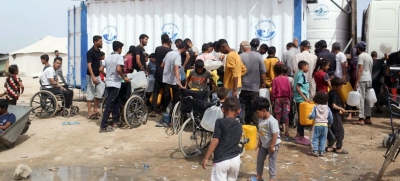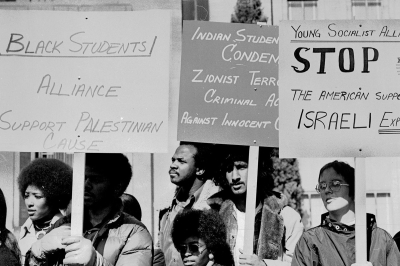Ten years ago, the combination of a military coup and a popular uprising overthrew Egypt’s first democratically elected president, Mohamed Morsi.
The Egyptian military had long been the country’s most powerful force behind the scenes. But in its takeover of the government, it stepped out from behind the curtain and has essentially been running the country ever since. There is a Parliament and elections in the country, but there aren’t really politics.
In June 2013, Morsi had only been in office a year to the day — his election followed the 2011 uprising that overthrew longtime dictator Hosni Mubarak. The revolution sparked tremendous hope in Egypt and around the world. But now, the country is more repressive than ever. The military’s takeover in July 2013 was met by a protest movement of Morsi’s supporters from the Muslim Brotherhood as well as other political activists. Egyptian security forces crushed their protest camps that summer; the most catastrophic date was August 14, 2013, when over a thousand demonstrators were massacred. Human Rights Watch said it likely constituted crimes against humanity. Hundreds of others were sentenced to death, and Morsi himself ultimately died as a prisoner of what could only be called negligence at the hands of the Egyptian state, collapsing after speaking in court in 2019.
Today, the former general Abdel Fattah el-Sisi, who served as Morsi’s defense minister, is the president. He won a basically uncontested election in 2018 with 97.08 percent of the vote, and a constitutional referendum extended his rule to 2030.
The military has arrested some 60,000 political prisoners, according to human rights monitors, but sources have told me that the number may be considerably higher.
Yet political expression endures, and Egyptians have carved space in other realms beyond electoral politics. Literature is a tool of rebellion, graphic novels capture social change, and brave journalists continue their important work.
In her new book Laughter in the Dark: Egypt to the Tune of Change, the Cairo journalist Yasmine El Rashidi documents how a young generation of musicians have persevered. She profiles mahraganat artists who mix hip-hop culture, rap, and Egyptian music to tell their own stories.
“In a political environment as fraught and oppressive as Egypt, it is always a risk for people to speak openly about their opinions and experiences,” she writes. “Politics and art collapse into one for the Egyptian citizen. They become inseparable.”
El Rashidi writes regularly for the New York Review of Books and authored the 2016 novel Chronicle of a Last Summer. I reached her by phone in Cairo, and our conversation has been lightly edited and condensed.
You begin the book by rehashing the history of the 2011 revolution and the 2013 coup, but you ended up focusing on music. Why is that?
For everyone who lived through the revolution of 2011, there is a sense of failure and defeat. If one is to step a little bit outside of that and look at the everyday happening in Cairo where I live, objectively, this idea that the revolution is dead, that the people are quiet — I could see that that wasn’t the case.
There was something happening with the youth, but not in the political sphere. Just eavesdropping on conversations of young people on the streets, on the public bus, and the metro, I could see there was a generation coming of age that seemed to have a very different mindset and mentality to that of my generation. They seemed much freer in their expression. I don’t necessarily mean politically, but even in talking of sexuality, or in their openness to fashion, like when you looked at young boys on the streets, how they were beginning to dress or do their hair. They were obviously influenced by what they were seeing in the West, but they didn’t seem as pressured to conform in the way that certainly my generation did.
This genre of music that I ended up writing about, mahraganat, was something that I was aware of in 2011, but at the time, we didn’t call it mahraganat. But the form was already there, which was that it was kind of rap or hip-hop. You were beginning to hear these young people in the square and beyond, you know, rapping about life.
In 2011, I met Sadat and Amr Haha, two of the people I write about in the book, and was drawn into that sphere of music. But the book didn’t come together until several years later, when the genre began to have more of a following. You began to hear it much more frequently. People started to talk about it.
:no_upscale()/cdn.vox-cdn.com/uploads/chorus_asset/file/24764119/474592225.jpg)
It was around that time that these two things came together for me: the observation about this young generation that I felt were quite different to my own, and quite uninhibited. And this music that was growing in popularity, that I was beginning to realize that more and more young people were listening to. It was an expression of what they were thinking and feeling.
And as the political atmosphere grew more and more repressive, the genre only seemed to grow, which ran contrary to our beliefs, or to previous patterns in our political history, and then we’ve always reverted to silence when the fear of crackdown increases. In this case, it seemed to be the opposite.
I was taken with the clarity with which you said that “Egypt is at its most oppressive point in its modern history.” But you’re also describing this social and societal change that’s happened. How do you reconcile that? Is that just the work of counterculture — and a countercultural music genre entering the mainstream of the country?
I raised this as a question in every conversation I have, here with friends, with sources, with contacts, especially with all the government is doing to try to keep this population contained, in terms of the anti-protest laws, or cracking down and arresting people who speak up against their economic conditions.
I know a craftsman, who sews in the tentmakers’ market, who put a video on Facebook last November talking about the prices of things and how difficult life has become, and he was taken from his home at four in the morning and disappeared for a few weeks, and was in prison for months. The stories are constant.
For all that the government is doing to try to keep that at bay, I’m constantly surprised that they are not addressing — and I’m going to say the “problem,” because I think it is a problem, I think it’s a time bomb — the problem of our enormous youth population.
Young people are extremely frustrated. And they’re uninhibited. I feel that they have no fears. They roam the streets with a lot of energy. And the government is doing nothing to address their needs. They’re not offering public spaces that they can be in, they’re not offering the kind of jobs that are going to entice them. The government is not addressing their needs and their energies.
I don’t think that they’re politically engaged or aware in the way that we were taking to the streets in protest of our circumstances. But they definitely have an energy that can unravel into something that will cause a political instability of sorts. I’m constantly surprised that the government doesn’t look at them and think, “Well, we have to do something, and do something in terms of actually creating opportunities for them, create public space that will engage them.” To be honest, it’s a big question mark for me.
In the book, you talk about the red lines and how they’ve changed over time, and how this genre of hip-hop challenges the red lines. How do you see the red lines today? And do any of these rappers talk about Sisi or the government directly?
Not directly in their lyrics. There’s so much that’s said that isn’t overtly political, but it is political. When you talk about economic circumstances and the sense of feeling very stifled by the country — when you speak about those things, you can’t really separate them from politics, even if you’re not directly addressing the government.
Going back to red lines: you tread carefully. I think much more about what I am putting out now than I ever did. It’s gotten to a point where anyone who does speak out, or is active on social media, is a little bit wary, because you don’t know.
On the one hand, we know that there are things that upset the government. On the other hand, it’s also quite arbitrary. It’s arbitrary in terms of who are they going to decide to make an example of next. It’s arbitrary in terms of who knows when their next post or tweet is going to go viral, Because those things irk the authorities.
After the experience of 2011 and the years since, it’s impossible to switch off from the politics of the country. You can’t just. It’s become a part of how we live and breathe, in a way that for some of us it wasn’t before pre-2011.
But I’ve been advised several times by friends, “You should really delete this post.” Or I’ve been around people who are politically active and thought twice or three times about the wording of something they’re going to put out, because you don’t know anymore.
The difference between Sisi and Mubarak is, under Mubarak, it was pretty clear what you could and couldn’t say. With this government, there’s a lot of gray areas. You just don’t know if you’re gonna say something that crosses a new red line, because those red lines are shifting, according to what’s happening in the day to day.






